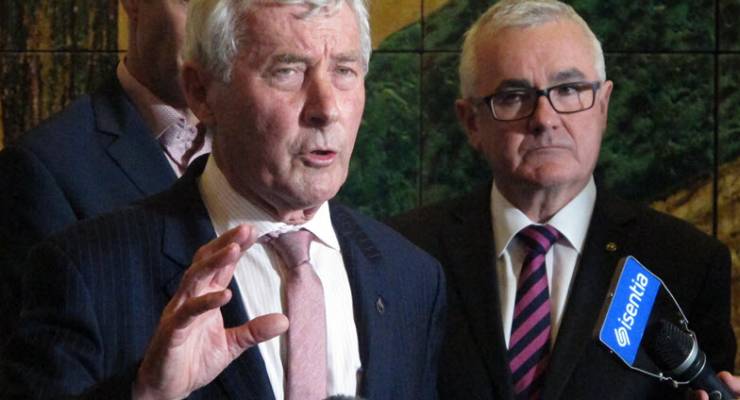
The efforts by director of public prosecutions Sarah McNaughton and Attorney-General Christian Porter to hide their prosecution of Witness K and Bernard Collaery from public scrutiny have sunk to new lows, with a last-minute attempt by the government to impose a super injunction-style gag on a hearing to determine how claims of national security secrecy should be handled in the trial.
After weeks of negotiations between K and Collaery’s legal teams and the Crown over how national security-related issues would be addressed, the DPP sprung a last-minute surprise on Tuesday night, just hours before the matter returned to the ACT Magistrate’s Court. The defence teams were informed that a full week before, prosecutors had given a brief as to the existence of national security information to Attorney-General Christian Porter.
This opens the way for Porter to issue a non-disclosure certificate which will trigger a secret hearing under section 29 of the National Security Information Act 2004 that could result in the entire trial being held in secret. The defence teams want those issues to be heard in open court under a separate section of the act.
The secret hearing would even prevent Bernard Collaery’s lawyers from attending, given they don’t have the kind of security clearance such a hearing would require.
The government has used the national security issue as an excuse not to provide a brief of evidence against K and Collaery. The lack of a brief means the defendants can’t even advise their legal teams given restrictions on sharing national security information. Collaery was unable to instruct him, barrister Chris Ward told the court: “The moment he speaks he breaches the Intelligence Services Act. This is seriously hampering our work.”
Ward also criticised the “deliberately late” s.29 advice by the Crown.
Crucial to the national security issue is exactly what information the Crown doesn’t want disclosed, given the key fact — that then-foreign minister Alexander Downer instructed ASIS to illegally bug the Timor-Leste cabinet, taking resources away from the fight against terrorism in Indonesia — is a matter of public record.
“The information the Commonwealth claims is likely to prejudice national security is already in the public domain and therefore cannot prejudice national security if discussed in open court,” Ward noted. K’s barrister Hayden Carmichael has indicated K’s only concern is that his identity remain secret.
Both defence teams have argued that the issues can be fully resolved at a three-day hearing in February, however prosecutors — extraordinarily — claimed this was insufficient time.
“This is the Commonwealth of Australia. It’s their prosecution. They’ve got the resources,” Ward shot back.
The timing will be decided at another hearing tomorrow. But it seems that the government has an agenda to drag the trial out for as long as possible — perhaps hoping the media will lose interest. Certainly it will have a major impact on Collaery, who is not taking any significant legal work at his Canberra practice until the matter is resolved.
All part of the harassment to which he and K have been subject for five years under both sides of politics.









I hate the ALP for their arse sitting.
Even assuming Witness K did anything genuinely wrong, why isn’t The Australian-the publication that first released the info (IIRC)-not named as a joint plaintiff? Are the Coalition *really* that scared of putting News Corpse off-side?
At the end of the day, though, there is only one person who most needs to be on trial…..and that’s Dolly Downer.
This is seriously a disgrace. I commend the lawyers having to try and find a way to get Collaery a fair trial, and this is exactly why I hate the general disrespect thrown at lawyers and legal technicalities, because the rule of law is all that stands between us and a totalitarian state. Turnbull and co carping about the Banking and Finance Royal Commission being a “lawyers’ picnic” and deliberately playing on peoples’ conditioning to hate lawyers should have been a clue ….
Wish that the ALP could find their way clear to protest at least a bit as to how this is currently handled, then deal with it properly once in government by having the whole thing withdrawn.
This is a disgraceful corruption of Australian democracy, for which this government deserves eternal condemnation, and for which the ALP is culpable by its silence. From the information that is now on the public record, the only alleged issues of ‘National Security’ are the revelations of the malevolence of a series of government ministers, DFAT and ASIS that will, it seems, be in evidence. We have a right to know. Timor L’Este has a right to know how and why Australia tried to screw a largely powerless small nation for the benefit of Woodside Petroleum. Extreme embarrassment for past malevolence is NOT a valid reason to appeal to ‘National Security! And, in the process, two innocent individuals are persecuted in an allegedly advanced democracy. This is a new low. But it will facilitate even worse in the future.
surely those matters which cannot be heard in open court – should briefly heard privately the rest in open court – anyhow if we want to know what is going one why doesn’t Crikey just ask the Russians or the Chinese or both.
Yes, our courts already allow for certain matters to be heard In Camera. We don’t need an entirely secret trial to deal with this matter.